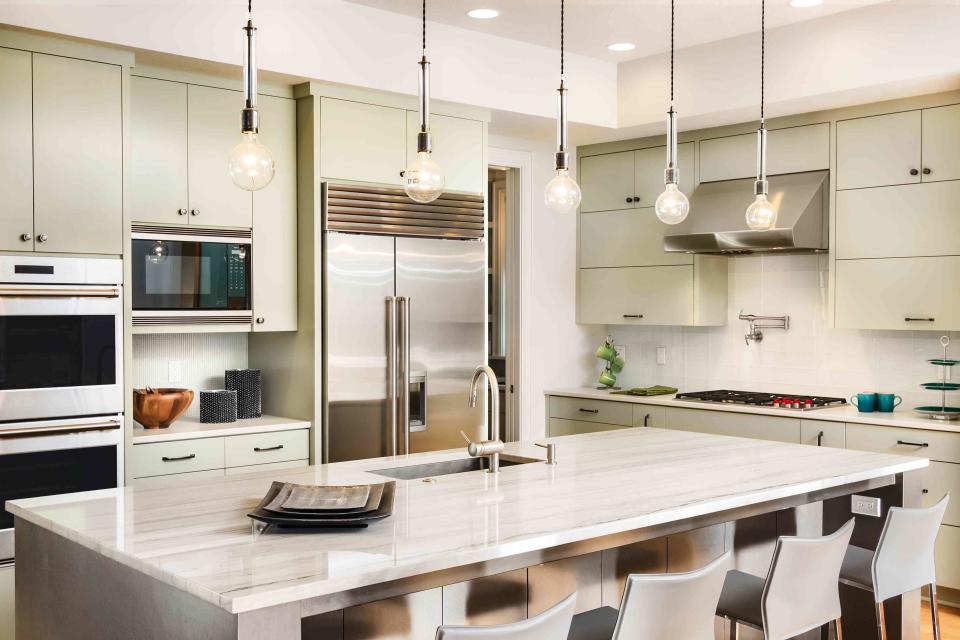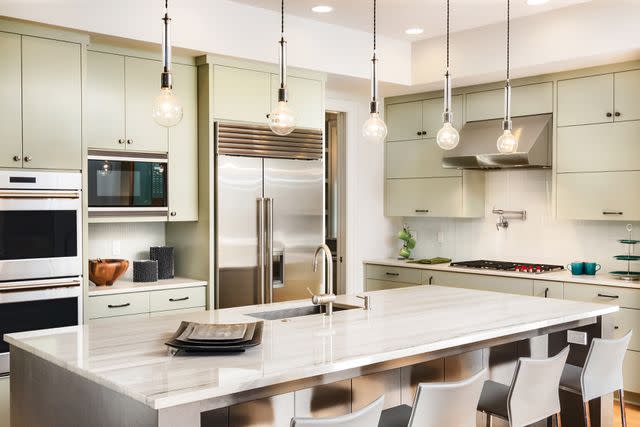How to Start Planning a Home Renovation
Before you break ground, there's a fair share of prep work to complete.

hikesterson / GETTY IMAGES
Whether you're updating a basement, a bathroom, or your entire house, the home renovation process involves a pretty big bell curve. At the beginning, you're bursting with excitement and inspiration about the transformation—and by the time the renovation is complete, you're equally as thrilled about with the results. You can enjoy your home more knowing that you've added to its value.
That said, the middle part—which involves the demo and construction phase—inevitably comes with some challenges. That's why it's important to carefully consider this section of the job at the very beginning. Doing your research, asking the right questions, and hiring the best contractors for the job can help ensure the bulk of the remodeling process goes smoothly. If you're in the early stages of planning a home renovation, follow these six steps—which will help you prevent any mistakes down the road.
Related:6 Affordable Renovations That Will Increase the Value of Your Home

hikesterson / GETTY IMAGES
Step 1: Make Sure the Renovation Is Worth the Time and Cost
Before you set your heart on a renovation, it's a good idea to step back and ask yourself about your goals. Are you seeking a renovation for purely aesthetic purposes, functional reasons, a value-add, or some combination of all three? "If the renovation you're considering is for your personal home, ensure that the changes you're considering are worth the cost to you," says Amalia Graziani, a developer and interior designer for Noor Property Group. "If you're improving a property for sale, ensure that the changes you're making will add value in significant excess of what you'll be spending."
Step 2: Research and Create a Game Plan
Once you've decided to move ahead with the renovation, carve out some time to do some research on the overall cost, expected timeline from start to finish, and potential curveballs. "There's no other way to make sure it's the right path forward other than by doing as much planning as possible, putting as much thought into it as possible, and talking to several experts to get the appropriate amount of feedback and information to make the best decision for yourself, in hopes you're moving toward the right path," says Jon Grauman, a real estate agent and developer.
Your research can also help you determine whether now's a good time to begin the renovation or if you should wait; you might also need a few more months to ensure your finances are in order. For example, you may discover the cost is a bit out of budget or the timeline doesn't align with your needs (like a busy sports season or back to school).
"Realistically, a large renovation with planning can take anywhere from six months to a couple of years," says Eddie Prchal, the CEO and co-founder of Gunner Roofing. "This is why it's crucial to understand the full project. We've had people that have entered the planning stage after getting to the estimate stage and realized it was cheaper to just move."

FollowTheFlow / GETTY IMAGES
Step 3: Establish a Budget and Account for Hidden Costs
With research underway, you'll be able to determine a rough cost for your renovation. While internet searches can get you in the ballpark, know that numbers vary widely and it's difficult to get a reliable estimation from Google alone. Prchal says your best bet is to call local contractors and request estimates. After gathering three to five, you should have a baseline of what to expect. "[Calling contractors for bids] is also another great way to figure out surprises that can come up," he says.
On that note, construction inevitably comes with some unforeseen costs—otherwise referred to as "slippage." For example, renovating a kitchen might reveal some plumbing issues, or redoing your windows might require you to swap out the trim, as well.
Plan to spend about 15 to 30 percent more than the actual quote you receive to cover these additional expenses and bake this cost into your budget. If you don't spend it, great. If you need it, you won't be thrown off guard. "The worst thing that can happen in the middle of a project is to be forced to cut corners or feel the pressure of having to make rash decisions with something you're most likely going to be reminded of, every time you look at the work that was done," says Kris Whitehead, the founder of New England Custom Remodeling.
If this additional expense pushes you beyond your preferred spend threshold, hold off until your budget allows.
Step 4: Find the Right Contractor for the Job
Selecting the best contractor for your renovation is integral to a smooth remodel. Excellent contractors are highly transparent, courteous of your time, stay on schedule, respect your home, and deliver impressive results.
Claire Zinnecker, an interior designer who's currently renovating a 120-year-old Victorian home, has some great advice on finding the best contractor. For starters, she insists on interviewing a minimum of three experts. From there, she says to speak with previous clients about their experience so you can get a better feel for their work and how they run a job.
Beware low estimates—they're often too good to be true. "I am very cautious when contractors have low estimates," says Zinnecker. "It typically means that they will increase those fees with change orders or delays. Things cost what they cost, so don't be fooled if someone's prices are significantly lower than the rest."
Look for a contractor who answers questions with honesty and patience, is timely and communicative, and has a good local reputation. It's also a great bonus if you get along. "More than likely you will have some trying times with your contractors, so you need to like them at the beginning," Zinnecker says.
Here are some questions you can ask to determine whether the contractor is a good fit for your renovation:
What licensing do you have? (They should be bonded and insured.)
Do you work with project managers?
How often do you provide updates?
How do you bill?
How do you track billing?
When can you begin work?
What does a timeline look like for this type of job and your availability?
Are you open to getting bids from multiple subcontractors to get the best price?
What happens if something goes wrong with the finished job a year after?
Step 5: Sign a Contract
A contract provides peace of mind as you head into a renovation and can give you a better idea of what to expect in a variety of scenarios. At a minimum, it should include your name and address, estimated start dates, warranty, a detailed scope of work, and payment terms, Prchal says.
"Be very wary of a contract that reflects a generic scope of work and [a contractor who] asks you to sign it without updating it. This can cause many headaches down the road," says Prchal. "Finally, read through the document fully and ask the contractor questions if you think something is included that shouldn't be. These contracts exist to protect not only contractors, but homeowners, as well."
Step 6: Prepare for the Job to Begin
A signed contract means it's officially time to prepare your home—and your mind—for the job to get underway. "What people don't expect about a renovation is how hard it can be emotionally," says Zinnecker. "You are dealing with so many decisions, so many changing targets—such as budget, scope, and timeline—and so many unknowns. And you're spending a lot of money."
The more prepared you are with understanding the nuances of the renovation, the better you'll be able to handle the inherent ebb and flow of the job.

